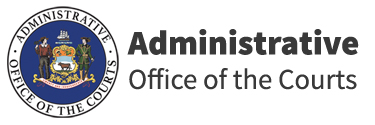Court Interpreter Program
Continuing Education Frequently Asked Questions
- To ensure that court interpreters listed in the Registry maintain and improve the skills, knowledge, and abilities needed to perform their duties in a competent, effective, and fair manner;
- To promote adherence to the highest principles of personal and professional conduct as stated in the Court Interpreter Code of Professional Responsibilities; and
- To assist interpreters in preserving the integrity, impartiality, and efficiency of the judicial system.
No; just as courses designed for the professional development of court interpreters are not acceptable to renew a registered nurse or attorney’s license. Each profession has specific continuing education requirements so that professionals in that field can maintain or improve their job performance.
No. Courses in ethics for medical interpreters are not eligible for any CEUs.
Advertisements may contain errors or unclear information for which the Delaware Court Interpreter Program is not responsible. It is in the best interest of interpreters to confirm approval with the CIP Coordinator.
Interpreters can benefit from many types of professional development, even from those that grant no CEUs. Interpreters are free to attend any course that interests them; however, not all courses may be eligible for CEUs. Interpreters must submit course information for approval from the CIP Coordinator at least thirty (30) days before attending a course, especially if the interpreter is short on credits. Courses that have not been approved in advance may be ineligible for CEUs.
For credits to be granted, the courses must be approved by the Delaware CIP, the interpreter must attend the course within the 2-year term for which interpreter is seeking credit and the interpreter must submit a valid certificate of completion as instructed in the CE Handbook, Section 5, “Reporting.” Credit-hours do not roll over to the following CE requirement period once the requirement period ends.
Each state has its own CE requirements and approval process. The Delaware CE policy applies only to Delaware. Interpreters that plan to submit certificate/s of attendance to multiple states should check the CE policy of each state and/or contact that state’s Program Coordinator. Likewise, a course approved for CEUs in another state may or may not be eligible for credit(s) in Delaware. It is in an interpreter’s best interest to contact Program Coordinators in advance for approval.
No. However, interpreters should contact the Delaware CIP Coordinator for approval in advance to make sure the course is eligible for Delaware CEUs if they plan to include it in their CEU submittal form.
CLAC Certification Skills-Building Workshops, interpretation and translation education programs offered by colleges or universities (Example; University of Arizona’s National Center for Interpretation) and training programs offered by other Consortium member states (Example: the Maryland Administrative Office of the Courts or the AOPC) are approved sources for continuing education. NAJIT and ATA conferences include multiple courses and presentations of which some may not qualify for Delaware CEUs. Interpreters should submit individual course/presentation descriptions for approval from the Coordinator of the Delaware Court Interpreter Program at least thirty (30) days prior to attending a conference to ensure that the proposed course/s meet CE requirements and if so, in which category (ethics, skill-building or general). Regarding providers such as American Pie Seminars or Transinterpreting.com, approval from the Coordinator must be requested at least thirty (30) days prior to attending to ensure that the proposed course is eligible for Delaware CEUs.
It is in an interpreter’s best interest to take CE courses throughout the year rather than to wait until the deadline is approaching or attend a single conference. Six (6) credit-hours must be obtained by attending live instructor-led classes (3 in Ethics and 3 in Skills Building- Modes of Interpretation) and these may not be available when interpreter is ready to attend. If interpreter has not completed the required 12 CEUs by the deadline, interpreter may be removed from the Registry.
No. Interpreter will need to reapply to the program. Interpreters must track their CE hours throughout the year and submit their compliance form and certificates to the Delaware CIP Coordinator two months before the deadline (October 2023, October 2025 and so on). If interpreter is short on one or more credits, interpreter must contact the Coordinator in writing with an action plan and request an extension. Only under these conditions may an interpreter be allowed submit CEUs after the deadline. Interpreters who fail to complete the required CE by the deadline and have not been granted extension will be removed from the registry.
Yes. The Delaware Court Interpreter Continuing Education Policy was provided to you with your Individual Services Agreement and the Delaware AOC Court Interpreter Program Policy Directive. The CIP Coordinator also emailed interpreters its new Continuing Education Handbook developed in March 2021. It will be updated September 2022 and a copy of the latest handbook will be accessible online at Delaware Court Interpreter Continuing Education Handbook.
You may direct additional questions regarding continuing education to the Court Interpreter Program Coordinator, at court.interpreterprogram@delaware.gov. We value your efforts to increase or maintain your interpreting skills and knowledge. Thank you for your cooperation and support to foster the court interpreter profession.
Return to Continuing Education page.
